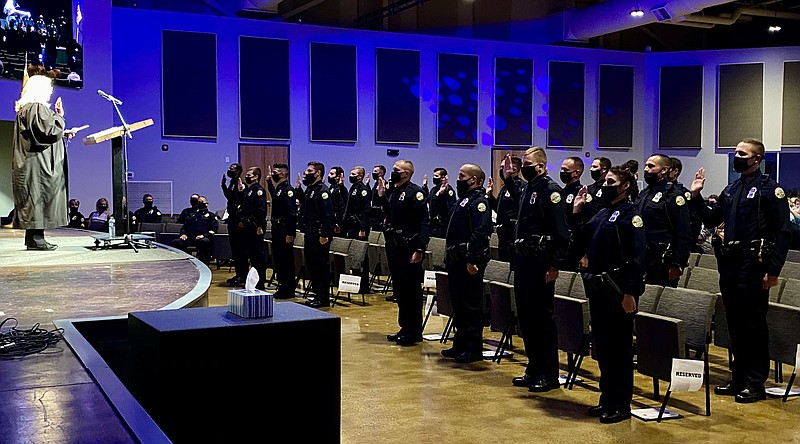Nearly seven years after setting a goal to recruit more diverse candidates and following a summer of global protests against racial injustice and police brutality amid a pandemic, the racial demographics of the Chattanooga Police Department's first 2021 cadet academy mostly reflect those of the city's population.
The 24-cadet class, including five women, is 54% white, 34% Black and 8% Hispanic or Latino, according to data provided by the department. As of July 2019, U.S. Census Bureau data shows Chattanooga's population is 62% white, 31% Black and 6% Hispanic or Latino.
"The Chattanooga Police Department as a whole has worked diligently for years now to become more diverse, and I couldn't be more proud of the efforts," Chief David Roddy said in a statement. "We are starting to see the result we've been striving for and that our community members have asked for."
Building a police force that reflects its community has long been a goal - and a struggle - for the department. It has tried a number of methods to bridge that gap over the years, including visiting universities, attending job fairs and personal recommendations with cash incentives.
And while this year's class mostly mirrors the city's racial demographics, there is still much work to be done, spokesperson Elisa Myzal said in a news release.
Currently, of the department's sworn officers, 13% are Black and 3% are Hispanic or Latino. Less than 1% are Asian, compared to 3% of the city's population.
Since 2016, the department's Each One Reach One initiative funded by a $10,000 grant from the Community Foundation of Greater Chattanooga offers $500 to each person who refers a minority candidate, when that candidate starts the police academy. After paying out $1,000 for recruits in this year's academy, $1,300 will still be up for grabs.
Because of the historical tension between police and communities of color, it's not just any person recruiters are looking for.
"The qualities that I would expect in a good officer are the same qualities that I would expect from just a good person," Roddy said in an interview last year. "If we are to staff and present a police department that looked like its community, then I would want the officers to have the same values and characteristics of the community that they come from."
Thoroughly screening and picking candidates based on their values rather than solely on their personalities or other qualifications is important, he said, "because of the inherent responsibility and authority of the position" and "so that we can trust them to make the difficult decisions when they have to."
To find those candidates, recruiters rely heavily on in-person interaction. But that is something that has been difficult to keep up during the COVID-19 pandemic.
"It's having that personal contact so that the individuals that we're interested in recruiting see and hear from us directly and hopefully figure out who we are," Roddy said. "And if they see part of themselves in what we emulate and what we express, then hopefully that attracts them to a job at the police department."
Another issue affecting minority recruitment is the tension between law enforcement and communities of color that dates back to the Jim Crow era and beyond. It comes to a boiling point each time protests erupt, just like this summer when worldwide protests were sparked by the May 25 death of George Floyd, a handcuffed Black man who died as a white Minneapolis police officer pinned him to the ground with his knee on his neck for nearly nine minutes.
In Chattanooga and Hamilton County, allegations of law enforcement brutality and misconduct - including rape, a roadside body-cavity search and a forced baptism - haven't helped.
Some local government leaders have said it's an issue that will take time to fix.
For example, when the city of Chattanooga voted to approve its police oversight board in 2019, Councilman Anthony Byrd, whose district includes Avondale and Eastside, said he told his constituents, "If you want to change the system, become a part of it and change it from within. That's why I became a council member."
Last year, the motto for the department's single academy was "Be the change you want to see."
Contact Rosana Hughes at 423-757-6327, rhughes@timesfreepress.com or follow her on Twitter @HughesRosana.
